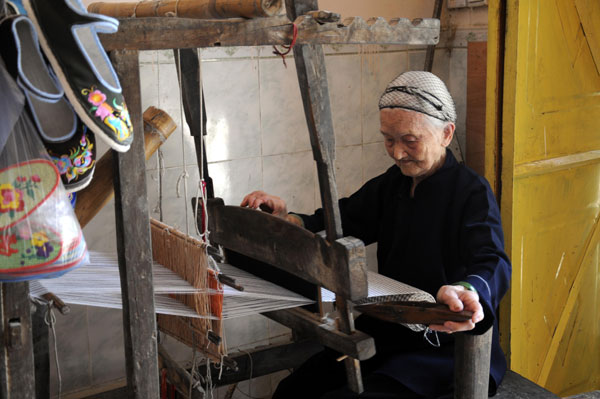Centenarians say age is just a number
Updated: 2012-09-06 09:17
By Xu Wei in Chongqing and He Dan in Beijing (China Daily)
|
||||||||
Natural conditions
The physical landscape can also have a positive effect on life span. Most of the areas of marked longevity identified by the Gerontological Society are located in South China, mainly along rivers or on the coast. By contrast, few areas in Northeast or Northwest China can boast a large number of centenarians.
"There must be an adequate supply of water and it must not be polluted," said Zhao, commenting on the factors that lead to extended life. "There must be a low rate of endemic disease and a low risk of other disease," he added.
Meanwhile, the air in heavily forested regions is likely to include a large number of negative ions, which are known to "capture" airborne pollutants, a factor that could lead to a lower incidence of pulmonary and cardiovascular illnesses.
Most areas where residents live measurably longer lives are at altitudes lower than 1,500 meters and are in temperate or subtropical climatic zones, said Wang Wuyi.
 |
|
Huang Magan, 107, is one of 87 centenarians in Bama Yao autonomous county in the Guangxi Zhuang autonomous region, most of whom are able to care for themselves. Liang Shaoen / Xinhua |
Meanwhile, the composition of dietary minerals in the soil could be another contributory factor. An analysis of the composition of the soil, water and food sources in Bama, allied with a study of the hair of residents, provided more clues for Yang. The soil has a slightly higher amount of manganese and zinc than usual, but also contains a relatively lower level of copper and chromium. "A higher amount of manganese and zinc is good for the blood, while a lower level of copper and chromium is good for the heart," he noted.
A similar study, conducted by Wang Wuyi in Guangxi's Yongfu county and Chongqing's Jiangjin district, found a high amount of selenium in the soil and water. While selenium salt is toxic in large volumes, trace amounts are believed to help in combating cancer.
Official supervision
The search to identify China's "Homes of Longevity" was part of an attempt to regulate the use of the title, according to Zhao. "Before we started the certification process, some local authorities had already awarded themselves the title and we felt there was a need for official supervision," he said.
In addition to the counties and districts that have been officially awarded the title, many more have applied for it.
Zhao pointed out that being awarded the title may produce a range of profitable industries - including social welfare, foodstuffs, tourism and real estate - all of which might motivate local authorities to apply to become a "Home of Longevity".
"A bag of rice might be only worth three yuan (50 US cents), but if it is produced at a home of longevity, it might suddenly be worth 30 yuan," he said. "For many of these secluded places, the title could help them alleviate poverty."
In Bama, tourism brought revenue of 406 million yuan during the first five months of this year as the county received more than 643,000 visitors. Meanwhile, the title has made it a hot vacation destination for seniors nationwide, boosting the local real estate industry in the process.
Future days?
While there have been economic benefits, it remains to be seen how the centenarians' health will be affected. In recent years, Yang has monitored rises in blood pressure, blood fats and sugars among the centenarians of Bama, meaning that the risk of cardiovascular disease is higher than before.
"Many centenarians have moved to urban areas with their sons or grandsons. Some have changed their eating habits, and many like to eat fatty pork because they have lost their teeth," said Yang, who added that, although it will take time to assess the impact of these changes, they could be seen as an early warning sign.
Yang has now decided to move his research from Bama to Yongfu county:
"The changing environment is making research difficult. There are too many variables that could potentially influence the longevity of the residents," he said. "It is a totally different world in Bama, compared with 1997, when I first arrived. At that time, many people still went around barefoot and buffalos plowed the fields. Now everything is different. The simplicity and tranquility of rural life are being lost and the real estate industry is quickly transforming the county into an urban jungle."
"Ecology is like a natural resource - once exhausted, it will never come back," he said.
Huang Feifei in Nanning contributed to the story.
Contact the reporters at xuwei@chinadaily.com.cn and hedan@chinadaily.com.cn

 Relief reaches isolated village
Relief reaches isolated village
 Rainfall poses new threats to quake-hit region
Rainfall poses new threats to quake-hit region
 Funerals begin for Boston bombing victims
Funerals begin for Boston bombing victims
 Quake takeaway from China's Air Force
Quake takeaway from China's Air Force
 Obama celebrates young inventors at science fair
Obama celebrates young inventors at science fair
 Earth Day marked around the world
Earth Day marked around the world
 Volunteer team helping students find sense of normalcy
Volunteer team helping students find sense of normalcy
 Ethnic groups quick to join rescue efforts
Ethnic groups quick to join rescue efforts
Most Viewed
Editor's Picks

|

|

|

|

|

|
Today's Top News
Health new priority for quake zone
Xi meets US top military officer
Japan's boats driven out of Diaoyu
China mulls online shopping legislation
Bird flu death toll rises to 22
Putin appoints new ambassador to China
Japanese ships blocked from Diaoyu Islands
Inspired by Guan, more Chinese pick up golf
US Weekly

|

|







